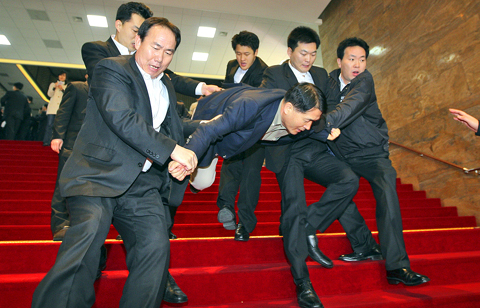Clashes broke out in South Korea yesterday when security guards tried to break up a protest by opposition lawmakers that has paralyzed parliament for weeks.
Several people were injured in the scuffle that broke out when about 200 guards began forcibly removing lawmakers holding a sit-in in the parliament building.
TV footage showed security guards grabbing some of the lawmakers by the arms and legs, while others linked arms and chanted slogans in protest.

PHOTO: AP
“I’ve never seen anything like this, even during the [late president Park Chung-hee’s] Yushin dictatorship,” said Chung Sei-kyun, leader of the main opposition Democratic Party (DP), who led the protest.
Authorities at the National Assembly had earlier asked the DP to end its sit-in and remove banners from the building’s walls.
Scores of DP legislators had occupied parliament since the middle of last month to prevent the ruling Grand National Party (GNP) pushing through a free trade pact with the United States and other controversial bills.
Clashes involving sledgehammers and fire extinguishers broke out on Dec. 18 after the GNP insisted the free trade pact, signed by Seoul and Washington last year but awaiting ratification by both legislatures, be approved quickly.
The opposition, which has 83 seats in the 299-member legislature compared with the GNP’s 172, said South Korea should not ratify it until the US Congress also moves to do so.
The ruling party has argued that the pact as necessary to stimulate the slowing economy and argues that approval by Seoul will encourage the US Congress to move faster.
But there is strong opposition to the pact among including farmers and other workers who fear it will hit jobs.
Also controversial is a bill to allow large businesses and newspapers to acquire controlling stakes in local broadcasters, which critics would strengthen the right’s control on news media.
The rival parties are also wrangling over tax cuts for the wealthy, easing regulations on industrial conglomerates’ ownership of banks and privatizing the state-run Korea Development Bank.

The US dollar was trading at NT$29.7 at 10am today on the Taipei Foreign Exchange, as the New Taiwan dollar gained NT$1.364 from the previous close last week. The NT dollar continued to rise today, after surging 3.07 percent on Friday. After opening at NT$30.91, the NT dollar gained more than NT$1 in just 15 minutes, briefly passing the NT$30 mark. Before the US Department of the Treasury's semi-annual currency report came out, expectations that the NT dollar would keep rising were already building. The NT dollar on Friday closed at NT$31.064, up by NT$0.953 — a 3.07 percent single-day gain. Today,

‘SHORT TERM’: The local currency would likely remain strong in the near term, driven by anticipated US trade pressure, capital inflows and expectations of a US Fed rate cut The US dollar is expected to fall below NT$30 in the near term, as traders anticipate increased pressure from Washington for Taiwan to allow the New Taiwan dollar to appreciate, Cathay United Bank (國泰世華銀行) chief economist Lin Chi-chao (林啟超) said. Following a sharp drop in the greenback against the NT dollar on Friday, Lin told the Central News Agency that the local currency is likely to remain strong in the short term, driven in part by market psychology surrounding anticipated US policy pressure. On Friday, the US dollar fell NT$0.953, or 3.07 percent, closing at NT$31.064 — its lowest level since Jan.

The New Taiwan dollar and Taiwanese stocks surged on signs that trade tensions between the world’s top two economies might start easing and as US tech earnings boosted the outlook of the nation’s semiconductor exports. The NT dollar strengthened as much as 3.8 percent versus the US dollar to 30.815, the biggest intraday gain since January 2011, closing at NT$31.064. The benchmark TAIEX jumped 2.73 percent to outperform the region’s equity gauges. Outlook for global trade improved after China said it is assessing possible trade talks with the US, providing a boost for the nation’s currency and shares. As the NT dollar

The Financial Supervisory Commission (FSC) yesterday met with some of the nation’s largest insurance companies as a skyrocketing New Taiwan dollar piles pressure on their hundreds of billions of dollars in US bond investments. The commission has asked some life insurance firms, among the biggest Asian holders of US debt, to discuss how the rapidly strengthening NT dollar has impacted their operations, people familiar with the matter said. The meeting took place as the NT dollar jumped as much as 5 percent yesterday, its biggest intraday gain in more than three decades. The local currency surged as exporters rushed to